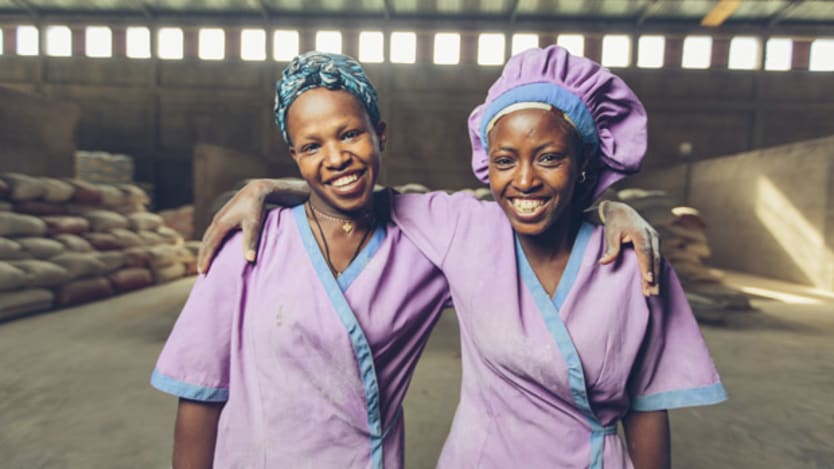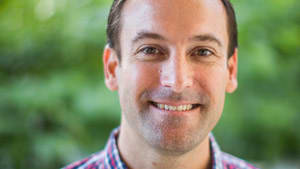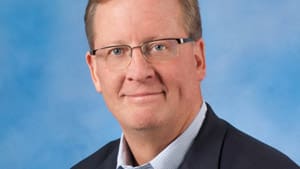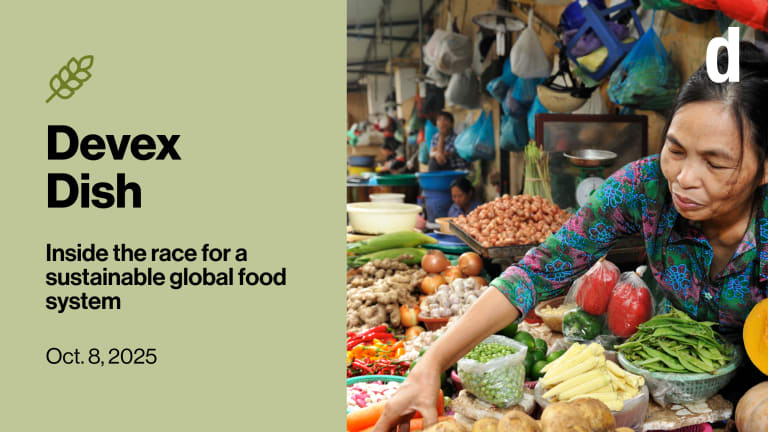How companies and NGOs can work together to tackle food security

While the year of agriculture and nutrition, as declared by the African Union, may be over, those issues will undoubtedly remain top development priorities and can present unique opportunities for collaboration with business.
Toward the end of last year, Devex Impact caught up separately with John Mendesh, General Mills’ vice president of research and development, and Brent Wibberley, director of PFS programs at TechnoServe, to talk to them about the private sector’s role in furthering agricultural productivity and nutritious foods. The two organizations partner closely on Partners in Food Solutions, a nonprofit organization which taps the business expertise of companies like General Mills, Cargill, Royal DSM and Bühler to help improve the capacity of small food processors in the developing world.
Through a virtual model that connects the expertise in multinational food companies with small business owners, the organization has reached more than 600 small businesses and believes they can scale rapidly to reach more.
By tackling food processing, the companies and partners can have a larger multiplier effect with less cost and effort, they said. By driving up the amount of grain a company is milling, for example, it could either increase prices or demand from smallholder farmers who supply the small business — thus improving not only their livelihoods but also eventually nutrition through the improved processing.
To learn more about how the private sector can tackle nutrition and help local agricultural processors, and the role nongovernmental organizations play in making the partnerships successful, here is an excerpt from the interviews.
What do you see as the role of private sector and organizations like Partners in Food Solutions in broader nutrition landscape?
Mendesh: I think there are two roles for the private sector to play. One is just doing business — the greatest thing we can do to advance nutrition and advance the livelihoods of the likes of smallholder farmers is to help build an economy and do business in Africa.
Secondarily and sort of what we do in the four partner companies via Partners in Food Solutions is lend our expertise and know-how to the food processing industry. We would call it probably technical philanthropy — lending our wisdom and expertise and the hundreds of years of experience that we’ve got not just in the technical organizations ... but the marketing and sales and the health and nutrition professionals in each of these [four] companies [as well].
Wibberley: As we look at the evolution of development this is something that is fairly new. If we look at the Partners in Food Solutions model … I think what they’re doing is an excellent example of taking what works in the private sector and applying it to the development context.
If you look at perhaps old school development or the reason this is a new way of thinking, if you look at comparing this to a typical consultancy — for example, a company may pay a consultant who is paid for delivery … [but] there’s a couple of aspects that are missing ... the amount of training that you pass on is very limited. Whereas in our model with these private companies, the technology transfer is going to the processor who is then implementing it and therefore has practically learned something, which they can apply again tomorrow.

The other aspect is you’re harnessing global competitive leaders in the food industry ... this model sort of allows you to look at companies holistically and understand where they sit. You’re getting the resources of these giant companies who are able to quite effectively and have often come across this challenge ages ago so very quickly address them or are up there with them fighting the same battle and are able to get to the solution quite a bit faster.
It’s really quite a progressive model. It’s certainly replicable.
What do you see as the greatest challenges in improving nutrition?
Mendesh: Some of it is fundamental consumer awareness. I’ll give you an example. In Ethiopia, the government just recently mandated fortification of flour, wheat flour in particular, and we’re helping the milling industry of Ethiopia determine how best to do that. From the consumer standpoint there’s not always 100 percent awareness … [about] fortification and if it is good thing, are they willing to pay for it.
What we’re trying to do is strengthen the technical know-how and the ability to do these things. But ultimately they have to be pulled through to the market. So consumers have to be aware of them, they have to taste good, they have to be economical. We’re working on that as well. The know-how in the go-to market strategies are the kinds of things we do all the time.
What are the biggest barriers to collaboration and progress?
Wibberley: I think competition is a big one. I would say some of the challenges would be at a corporate culture level because some of the culture can permeate and also it can prevent — you may have an answer but decide you’re not going to share it, so where do you draw the line.
Companies that get involved need to have a very clear understanding of their corporate interests versus their development interests. For example, if a company is working in Kenya and they have sales [representatives] in Kenya and they’re out selling a product … then at some point in the field you’re going to have a sales agent in that country bumping into a development agent in that company saying why are you giving them free service when I’m charging them. There is room for that complexity to happen and muddy the waters and confuse the beneficiaries. So I think they have to be very clear in their program design and in their communications in their own companies on how they’re going to go about pairing the two up.
PFS works closely with TechnoServe — given that experience what do you feel the role of development organizations is in programs and partnerships such as this one?
Mendesh: I can talk specifically about TechnoServe. Their awareness of the situation on the ground and their eyes and ears and long history of knowing the terrain is very valuable. The kinds of transfer of wisdom and knowledge that we’re doing, given that we’re doing it remote, really requires that somebody on the ground has got their antenna up and is well-schooled in the local markets and traditions and so forth, and they’re great at that. We also like the fact that they’re also very much business oriented. They tap into what business does every day and even as a standalone NGO and that’s really what attracted us to them and it’s proven to be a good partnership.
What do you see as the value add of NGOs or development organizations? From your experience what do you think other organizations can do to successfully work with the private sector?
Wibberley: If you think about the beneficiaries, you’re helping the companies and enterprising people out there that want to do better, want to get out of poverty [and] want to have a more nutritional diet. You need to speak their language and understand what drives them and understand market dynamics and the environment and the sort of economic factors that are at play for them and the infrastructure and industries and sort of matrix they live in and challenges they’ve had.
It’s being able to speak to both sides. … We’re able to [help] big institutional donors … [understand] some of the private sector language and ... [interpret some of the development context to] the private sector.
I think having that local context, being able to recognize what all of the other players are doing and facilitating that so you make it easier for the private companies, you take a lot of the risk away from them and are able to contextualize for them why you should go down a certain path. Being able to show these are the trends from development and these are the learnings from development … being able to help bring that to their attention what is meeting their objectives and also meeting the government's development objectives.
And lastly, it’s respecting the private company as well. Before getting into partnership with them on any of these deals, understanding right off from the get go what their interests are in getting into this development exercise.

Will you be looking to more partners to successfully carry out your work?
Mendesh: I don’t know that we need new partners as much as we need to continue to tap into what is a growing middle class. It’s a virtuous model. The more demand there is and the better the products are, the more nutritious, the value, the more demand you’re creating for smallholder farmers’ crops. We’re hoping to help create the wave where the emerging middle class is growing and also benefit from the wave and do more business there.
You talk about marketing to and creating products for the emerging middle class. What about base-of-the-pyramid consumers, who are often those suffering the greatest nutrition challenges and where there is typically less of a business case?
Mendesh: There is a business case and that’s where we start. The average of these 600 food companies that we’re helping, the average annual sales is certainly less than $100,000 ... we’re talking about really small companies that are serving folks all the way to the bottom of the pyramid, maybe even starting with relief food.
Looking ahead, what will be critical to meeting some of the critical nutrition needs, including the ambitious plans outlined at the Second International Conference on Nutrition?
Wibberley: I think all of these things require, if it’s going to go to scale, it requires taking a lot of the best practices and learnings that have been undertaken by a myriad of programs and entities and then taking them nationally. I don’t think any one NGO or even foreign institutional donor or any of those players can do it on their own. I definitely think it requires an integrated approach and we need to look at the food system if you will and there is no one entity that is an expert in all of that. In my view it takes a country’s government to get involved to see the actual impact on scale.
Join Devex to network with peers, discover talent and forge new partnerships in international development — it’s free. Then sign up for the Devex Impact newsletter to receive cutting-edge news and analysis at the intersection of business and development.
Search for articles
Most Read
- 1
- 2
- 3
- 4
- 5








